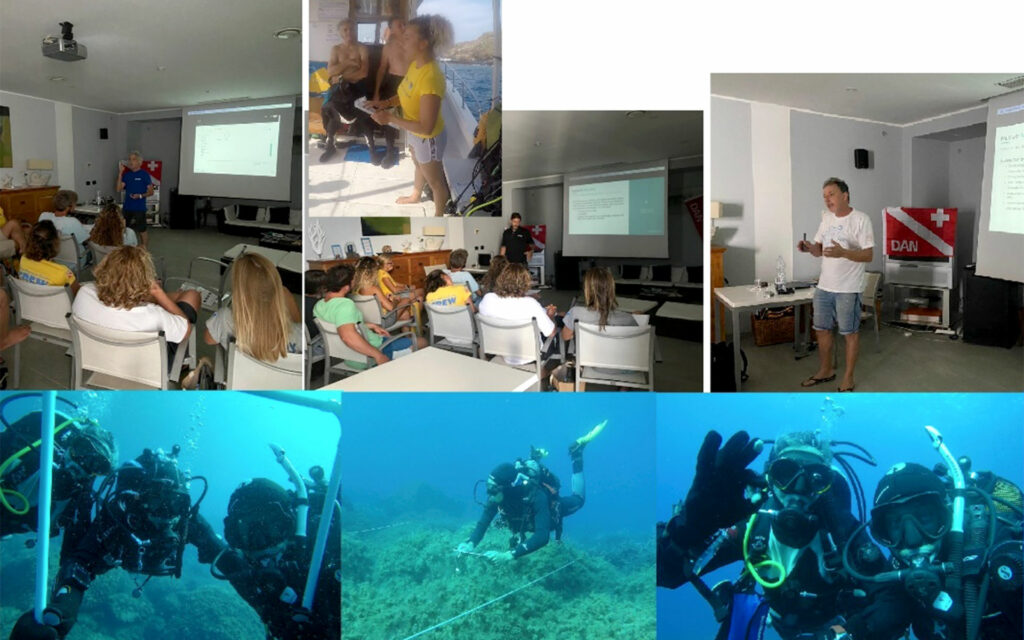DAN Europe hosts a hybrid training programme on marine citizen science in Ustica Island. This training is designed to equip recreational divers with the necessary skills to engage into citizen science in order to contribute to the assessment of climate change impacts in the Mediterranean sea.
As Mediterranean ecosystems face mounting pressure from climate change, overfishing, and pollution, Marine Protected Areas (MPAs) are increasingly recognized as key strongholds for resilience and adaptation. But their effectiveness depends not only on policies and protections—it also requires people. Local communities, divers, students, and conservation professionals all have a crucial role to play in monitoring, preserving, and restoring marine life.
That’s the driving idea behind a new training initiative developed under the MPA4Change project: a hybrid training programme designed to equip a wide range of participants with the skills and tools to engage in citizen science—a form of participatory research that turns divers and ocean enthusiasts into active contributors to marine conservation.
On July 2025, the island of Ustica—home to one of Italy’s oldest MPAs—became the backdrop for this training, which blends online learning with immersive fieldwork in the island’s crystal-clear waters. The initiative is a collaboration between local institutions, diving centres, conservation organisations, and MPA authorities, brought together through the support of DAN Europe and MPA4Change project partners.
A new approach to learning underwater
What makes this programme different is its dual format. Before ever setting foot on a boat, participants began with a self-paced online training hosted on an e-learning platform created specifically for MPA4Change. There, they dived into the fundamentals of citizen science, marine ecology, and underwater monitoring techniques. This digital phase laid the foundation for what came next: three days of practical, field-based learning in Ustica.
During the in-person component, which took place from 9 to 11 July 2025, trainees worked side-by-side with scientists, NGO staff, and dive instructors, applying monitoring protocols in real marine environments. It’s a rare opportunity to transform theory into practice, and to experience the scientific process from a diver’s perspective.
Fostering community, science, and stewardship
However, beyond skill-building, the training has another important goal: connection. The programme is designed for a diverse audience—from recreational and technical divers to marine biology students, environmental educators, ecotourism operators, and MPA staff. By bringing together people from different backgrounds, the course fosters collaboration and shared ownership of marine protection.
Participants learned to conduct underwater surveys, identify key species, and document climate-related changes to marine habitats. Protocols include fish visual censuses, monitoring of mass mortality events, surveys of Pinna nobilis populations, and assessment of Posidonia oceanica meadows—one of the Mediterranean’s most important carbon sinks.
Each observation made by participants contributes to a broader dataset, supporting long-term efforts to track the health of marine ecosystems and to adapt MPA management strategies to a changing climate.
A Blueprint for the Future
Initiatives like this are more than training sessions—they are blueprints for resilience. As the Mediterranean continues to warm and marine biodiversity faces new threats, the ability to engage citizens in monitoring and protection becomes essential. Through knowledge sharing, hands-on experience, and cross-sector collaboration, this programme builds capacity not just for individuals, but for entire coastal communities.
For DAN Europe and the wider MPA4Change network, Ustica is just the beginning. It’s a living laboratory where the future of marine conservation can be imagined, tested, and scaled.
📌 You can find out more about the training programme here: https://mpa4change.interregeuro-med.eu/training-on-climate-change-adaptation



